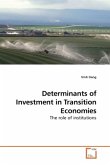In the 21st century, Bosnia is still struggling politically, socially, and economically. The country's standard of living is lower than its 1980s level due to severe consequences of the civil war in early 1990s. About 60% of young people want to leave the country because of the lack of opportunities. Bosnia's main three ethnic groups still appear to have not reconciled their differences, and their respective politicians constantly run around in circles, which significantly slows the country's progress and integration in the European Union. This thesis sheds some light on Bosnia's transition from a pre-war socialist society to a modern capitalist society it thrives to be. Important factors in Bosnia's transition include its unique history, which is a base for nationalistic movements, choice of privatization methods and the corruption in legislative and judicial branches of government.








